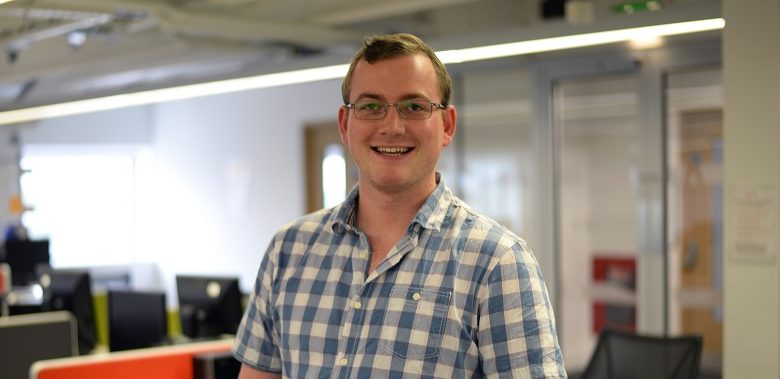
Overcoming a stutter to fulfil my dream of teaching
Adam Black shares his experience of living with a stutter and how he overcame his condition with help from The McGuire Programme. The course gave him the confidence to follow his dreams of becoming a teacher and to support others who also have difficulties with stuttering.
Stuttering is a hidden disability that affects 1% of the world’s population. For many people who stutter, the world can be an intimidating place to live, and one where a stutterer can feel isolated. Renowned speech pathologist, Joesph Sheehan, describes stuttering as an iceberg. People only see 10% of the stuttering – blocking, freezing or sound repetitions – and the other 90% is underneath the surface – shame, embarrassment, lacking confidence, sadness. The 90% below the surface is often the hardest part for people who stammer.
As a stutterer myself, I used to be anxious and embarrassed every time I spoke. I felt alone and that no one could understand my situation. I left school and chose a course at college that involved little to no speaking, even though all I wanted to do was be a teacher. I hated the feeling of wanting to do one thing, but being forced to do something else. It left me frustrated at myself and at the world around me.
The McGuire Programme
Around 10 years ago I knew something needed to change, so I started searching for help. I found a stuttering therapy course called The McGuire Programme. It is a unique therapy as it is run by people who also stutter.
The course itself follows a rigorous four-day format and entails 15 hours of intense speech work every day. The intensity means that you give yourself every chance of making the changes needed to tackle your stammering.
The McGuire Programme taught me both physical and physiological techniques to control my stutter. This included learning a new way to breathe when speaking, called costal breathing. It is a type of breathing that opera singers use and is a way to give your voice more power.
Another important aspect I learnt was to use an assertive tone when speaking, as well as not holding back on sounds.
The physiological techniques involved defeating the negative associations that I had built up around speaking. This included speaking dysfluently (i.e. where the speech isn’t completely fluent) in a controlled way. Being dysfluent on my own terms – because I made it so, not because of my stammer – gave me the confidence to accept that it is fine to speak differently from other people. It allowed me to stop hiding and to accept myself as a person who stutters.
This shift in mindset was the most difficult change, but was the most important. I was finally accepting who I really am. By accepting myself as a person with a stutter, I was dealing with those feelings below the surface and melting away the 90% of ice.
After my first course, everything changed for me. I no longer felt alone. I had a supportive community of other people who knew how I was feeling, and I knew that a coach was only a phone call away if needed any advice or help.
Following my dreams to become a teacher
Around eight years ago I decided to finally follow my dreams and retrain as a teacher. I felt I was at a stage where my speech would no longer have an impact on how I lived my life or my ability to give children a solid education. I now work in a busy primary school in Glasgow.
I am very open and honest about my disability with colleagues, parents and children. I help to show children that it is perfectly acceptable to be different. In turn, parents of the children appreciate that their child is being taught by a person who is honest about who they are. I also believe that my honesty gives hope to people who also struggle with barriers to achieving their full potential.
I have also been selected for a voluntary role as the Equality and Diversity representative for Glasgow teachers. It means I can speak to others in the profession about any issues that they may have with regards to equality and diversity. I’m incredibly happy to be able to take on this role, but it’s one the old me certainly never imagined I’d be doing.
Since joining The McGuire Programme and accepting my hidden disability I have achieved things I never thought I would. I have presented at academic conferences (where I have relayed data from my master’s level qualification), given a best man’s speech and even a speech at my own wedding.
It’s also the little things that matter, such as being able to order a takeaway or get a train ticket. The McGuire Programme changed my life.
Education and awareness of stuttering is key


Over the past 11 years, I have dedicated much of my spare time to promoting awareness of stammering to reduce the stigma around speaking to people who stutter. Sharing my story in newspapers, on the radio and on live TV on several occasions is starting to break down preconceptions.
I also take opportunities to present on stuttering at teacher conferences in an attempt to ‘normalise’ stuttering and to support teachers who have children who stutter in their classes.
Sharing small tips or ideas to make the learning process more enjoyable or accessible to children who stammer is something I will continue to for the rest of my life. If it helps just one child every time I speak, then I’ve done something worthwhile.
Because of the work I have done so far, I received a British Citizen Award in January 2017 for my services to education (see picture above).
So, if you take one thing away from this article, I hope it will be that you should embrace your quirks as they make you who you are. When I finally did that, I started to like myself and my life a whole lot more.
By Adam Black
For more information on The McGuire Program, visit www.mcguireprogramme.com/en
Check out…
Helllo Adam. I made a conscious decision to tackle my stuttering in my early teens. I became very good at planning my words and anticipating any potential stutters. i became a teacher as well.